On this Day in History ... 4th June
04 Jun is in June.
Events on the 4th June
On 04 Jun 1094 Sancho Ramírez I King Aragon V King Pamplona (age 52) died. On 04 Jun 1094 His son Peter I King Aragon I King Pamplona (age 26) succeeded I King Aragon, I King Pamplona.
On 04 Jun 1246 Isabella of Angoulême Queen Consort England (age 58) died at Fontevraud Abbey [Map]. Her son Hugh Lusignan XI Count Lusignan VI Count La Marche II Count Angoulême (age 25) succeeded II Count Angoulême. Yolande Capet Countess Lusignan, La Marche and Angoulême (age 27) by marriage Countess Angoulême.

Archaeologia Volume 35 1853 XXXIII. On the 4th of June [1358], Isabella (age 63) set out on a pilgrimage to Canterbury, and a visit of nearly three weeks' duration to Leeds Castle [Map]. She rested at Tottenham on the 4th, at London on the 5th and 6th, where she received the Countess of Warren (age 62) to dinner, and many noblemen after dinner. At Dartford on the 7th; at Rochester on the 8th, the Countess of Warren again dining with her. At Ospringe on the 9th, and at Canterbury on the 10th and 11th; entertaining there the Abbot of St. Augustine's both days. Under the division of "Alms" are recorded the Queen's oblations at the tomb of St. Thomas; the crown of his head ( the part having the tonsure, cut off by his assassins ), and point of the sword (with which he had been slain); and her payment to minstrels playing "in volta;" as also her oblations in the Church of St. Augustine, and her donations to various hospitals and religious houses in the city.
On 03 Feb 1388 the Merciless Parliament commenced. It ended on 04 Jun 1388. Its primary function was to prosecute members of the Court of King Richard II of England (age 21). The term "Merciless" is contemporary having been coined by the chronicler Henry Knighton.
Michael de la Pole 1st Earl Suffolk (age 58) was sentenced to be hanged, drawn and quartered in his absence. He had escaped to France.
Archbishop Alexander Neville (age 47) was found guilty of treason and it was determined to imprison him for life in Rochester Castle, Kent [Map]. He fled to Louvain [Map] where he became a parish priest for the remainder of his life.
On 19 Feb 1388 Robert Tresilian was hanged naked and his throat cut. See Chronicle of Adam of Usk.
On 25 Mar 1388 Nicholas Brembre was hanged. He was buried at Christ Church Greyfriars [Map].
On 05 May 1388 Simon Burley (age 48) was executed despite the protestations of his friend Edmund of Langley 1st Duke of York (age 46). See Chronicle of Adam of Usk.
On 12 May 1388 John Beauchamp 1st Baron Beauchamp (age 69) was beheaded at Tower Hill [Map]. He was buried at Worcester Cathedral [Map]. Baron Beauchamp of Kidderminster forfeit.
Robert de Vere 1st Duke Ireland (age 26) was attainted.
On 04 Jun 1394 Philippa Lancaster Queen Consort Denmark was born to King Henry IV of England (age 27) and Mary Bohun (age 26) at Peterborough Castle [Map]. Her mother (age 26) died in childbirth. She was buried at Church of the Annunciation of our Lady of the Newark [Map]. Coefficient of inbreeding 2.60%. 

Wriothesley's Chronicle 1530-1539. 04 Jun 1535. This yeare, the 4th day of June, were diverse Dutch men and weomen convicted for heresie to the number of 22,a of the which 14 were condemned, and two of them, that is to say a man and a woman, were brent in Smythfeild [Map] this day at three of the clocke in the aftemoone, and the other 12 were sent to diverse good townes in England, there to be brent; and the residue were converted and commaunded to departe out of this realme within 14 dayes into their countries, on payne of death at the Kings pleasure.
Note a. On the 25th May, in St. Paul's church at London, 19 men and 6 women, born in Holland, were examined, of whom 14 were convicted as Anabaptists.—Stow.
On 04 Jun 1550 Robert Dudley 1st Earl of Leicester (age 17) and Amy Robsart (age 17) were married at Sheen Palace [Map]. King Edward VI of England and Ireland (age 12) and William Cecil 1st Baron Burghley (age 29) attended. He the son of John Dudley 1st Duke Northumberland (age 46) and Jane Guildford Duchess Northumberland (age 41).


On 24 Jun 1584 Dorothy Vernon (age 53) died. On 04 Jun 1611 John Manners (age 84) died at Haddon Hall [Map]. Both were buried at All Saint's Church, Bakewell, Derbyshire [Map]. Elizabethan Period facing each other. Complex armorial of his arms impaled with her arms.

Arms of John Manners (age 57) impaled with those of Dorothy Vernon (age 53).

On the left, Top Row: 1  Manners Augmented Arms 2 His great-grandmother Eleanor Ros.
Manners Augmented Arms 2 His great-grandmother Eleanor Ros.
Second Row: 5  Beauchamp Arms 6
Beauchamp Arms 6  Beaumont Arms 7
Beaumont Arms 7  Berkeley Arms 8
Berkeley Arms 8  Lisle Arms.
Lisle Arms.
Third Row: 11  Tiptoft Arms.
Tiptoft Arms.
On the right the arms of Dorothy Vernon (age 53). Top Row: 1  Vernon Arms. Her arms. Second Row: 5
Vernon Arms. Her arms. Second Row: 5  Welles Arms. Third Row: 9
Welles Arms. Third Row: 9  Tailboys Arms. Fourth Row: 10
Tailboys Arms. Fourth Row: 10  Berkeley Arms.
Berkeley Arms.
Dorothy Vernon: In 1531 she was born to George Vernon "King of the Peak" and Margaret Tailboys. Before 22 Mar 1572 John Manners and she were married. He the son of Thomas Manners 1st Earl of Rutland and Eleanor Paston Countess Rutland. He a great x 5 grandson of King Edward III of England.
John Manners: In 1527 he was born to Thomas Manners 1st Earl of Rutland and Eleanor Paston Countess Rutland.
Eleanor Ros: Around 1449 she was born to Thomas Ros 9th Baron Ros Helmsley and Philippa Tiptoft Baroness Ros of Helmsley. In or before 1460 Robert Manners and she were married. He a great x 5 grandson of King Edward "Longshanks" I of England. She a great x 5 granddaughter of King Edward "Longshanks" I of England. In 1487 Eleanor Ros died. In 1492 George Manners 11th Baron Ros Helmsley became a ward of his uncle-in-law Thomas Lovell, husband of his mother's sister Isabel Ros as a consequence of his father Robert Manners being deemed unable to administer his own affairs.
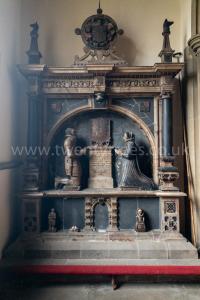
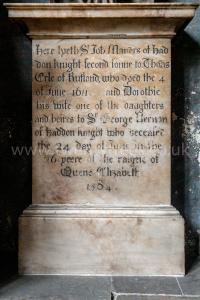
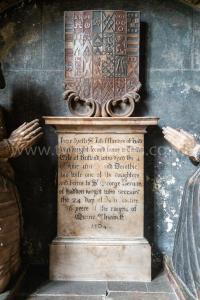
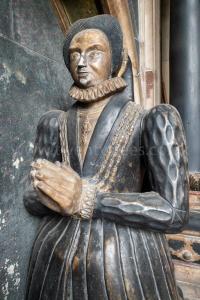
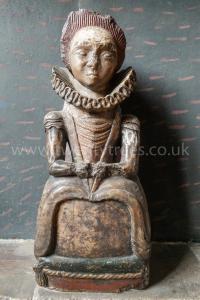
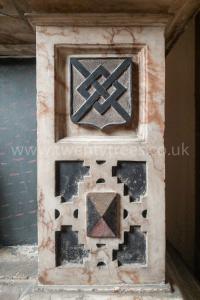
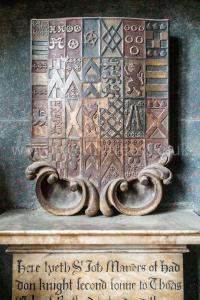
Evelyn's Diary. 04 Jun 1660. I received letters of Sir Richard Browne's (age 55) landing at Dover, Kent [Map], and also letters from the Queen (age 50), which I was to deliver at Whitehall, not as yet presenting myself to his Majesty (age 30), by reason of the infinite concourse of people. The eagerness of men, women, and children, to see his Majesty (age 30), and kiss his hands, was so great, that he had scarce leisure to eat for some days, coming as they did from all parts of the nation; and the King (age 30) being as willing to give them that satisfaction, would have none kept out, but gave free access to all sorts of people.


Evelyn's Diary. 04 Jun 1660. Addressing myself to the Duke (age 26), I was carried to his Majesty (age 30), when very few noblemen were with him, and kissed his hands, being very graciously received. I then returned home, to meet Sir Richard Browne (age 55), who came not till the 8th, after nineteen years exile, during all which time he kept up in his chapel the Liturgy and Offices of the Church of England, to his no small honor, and in a time when it was so low, and as many thought utterly lost, that in various controversies both with Papists and Sectaries, our divines used to argue for the visibility of the Church, from his chapel and congregation.

Pepy's Diary. 04 Jun 1665. Thence to my chamber again to settle my Tangier accounts against tomorrow and some other things, and with great joy ended them, and so to supper, where a good fowl and tansy, and so to bed. Newes being come that our fleete is pursuing the Dutch, who, either by cunning, or by being worsted, do give ground, but nothing more for certain. Late to bed upon my papers being quite finished.
Before 04 Jun 1666 William Clarke (age 43) died after having had his leg amputated following the Four Days' Battle.
Pepy's Diary. 04 Jun 1666. THE FIGHT.
How we found the Dutch fleete at anchor on Friday half seas over, between Dunkirke and Ostend, and made them let slip their anchors. They about ninety, and we less than sixty. We fought them, and put them to the run, till they met with about sixteen sail of fresh ships, and so bore up again. The fight continued till night, and then again the next morning from five till seven at night. And so, too, yesterday morning they begun again, and continued till about four o'clock, they chasing us for the most part of Saturday and yesterday, we flying from them. The Duke (age 32) himself, then those people were put into the catch, and by and by spied the Prince's (age 46) fleete coming, upon which De Ruyter (age 59) called a little council (being in chase at this time of us), and thereupon their fleete divided into two squadrons; forty in one, and about thirty in the other (the fleete being at first about ninety, but by one accident or other, supposed to be lessened to about seventy); the bigger to follow the Duke (age 32), the less to meet the Prince (age 46). But the Prince (age 46) come up with the Generall's fleete, and the Dutch come together again and bore towards their own coast, and we with them; and now what the consequence of this day will be, at that time fighting, we know not. The Duke was forced to come to anchor on Friday, having lost his sails and rigging. No particular person spoken of to be hurt but Sir W. Clerke (age 43), who hath lost his leg, and bore it bravely. The Duke himself had a little hurt in his thigh, but signified little. The King (age 36) did pull out of his pocket about twenty pieces in gold, and did give it Daniel for himself and his companion; and so parted, mightily pleased with the account he did give him of the fight, and the successe it ended with, of the Prince's (age 46) coming, though it seems the Duke (age 32) did give way again and again. The King (age 36) did give order for care to be had of Mr. Daniel and his companion; and so we parted from him, and then met the Duke [of York], and gave him the same account: and so broke up, and I left them going to the surgeon's and I myself by water to the 'Change [Map], and to several people did give account of the business.

Pepy's Diary. 04 Jun 1666. Up, and with Sir J. Minnes (age 67) and Sir W. Pen (age 45) to White Hall in the latter's coach, where, when we come, we find the Duke (age 32) at St. James's, whither he is lately gone to lodge. So walking through the Parke we saw hundreds of people listening at the Gravel-pits, [Kensington] and to and again in the Parke to hear the guns, and I saw a letter, dated last night, from Strowd (age 38), Governor of Dover Castle, which says that the Prince (age 46) come thither the night before with his fleete, but that for the guns which we writ that we heard, it is only a mistake for thunder1 and so far as to yesterday it is a miraculous thing that we all Friday, and Saturday and yesterday, did hear every where most plainly the guns go off, and yet at Deale [Map] and Dover, Kent [Map] to last night they did not hear one word of a fight, nor think they heard one gun. This, added to what I have set down before the other day about the Katharine, makes room for a great dispute in philosophy, how we should hear it and they not, the same wind that brought it to us being the same that should bring it to them: but so it is. Major Halsey, however (he was sent down on purpose to hear newes), did bring newes this morning that he did see the Prince (age 46) and his fleete at nine of the clock yesterday morning, four or five leagues to sea behind the Goodwin [Map], so that by the hearing of the guns this morning we conclude he is come to the fleete.


Note 1. Evelyn (age 45) was in his garden when he heard the guns, and be at once set off to Rochester, Kent [Map] and the coast, but he found that nothing had been heard at Deal (see his "Diary", June 1st, 1666).
Evelyn's Diary. 04 Jun 1679. I dined with Mr. Pepys (age 46) in the Tower of London [Map], he having been committed by the House of Commons for misdemeanors in the Admiralty when he was secretary; I believe he was unjustly charged. Here I saluted my Lords Stafford (age 64) and Petre (age 53), who were committed for the Popish plot.
Evelyn's Diary. 04 Jun 1685. Then the King (age 51) rose, the Lords accompanying him to his bed-chamber, where, whilst he repos'd himselfe, tired indeede as he was with griefe and watching, they return'd againe Into the Council-chamber to take order for the proclaiming his Ma*, which (after some debate) they consented should be in the very forme his grandfather K. James I. was, after ye death of Queene Elizabeth; as likewise that the Lords, &c. should proceede in their coaches thro' the Citty for the more solemnity of it. Upon this was I, and severall other Gentlemen waiting in the Privy-gallerie, admitted into ye Council-chamber to be witnesse of what was resolv'd on. Thence with the Lords, the Lord Marshall and Heraulds, and other Crowne Officers being ready, we first went to White-hall gate, where the Lords stood on foote bare-headed, whilst the Herauld proclaim'd his Majesty's title to the Imperial Crowne and Succession according to ye forme, the trumpets and kettle-drums having first sounded 3 times, which ended with the people's acclamations. Then a Herauld call'd the Lords' coaches according to rank, myselfe accompanying the solemnity in my Lord Cornwallis's (age 29) coach, first to Temple Barr, where the Lord Maior and his brethren met us on horseback, in all theire formalities, and proclaim'd the King; hence to the Exchange in Cornhill, and so we return'd in the order we set forth. Being come to Whitehall, we all went and kiss'd the King (age 51) and Queenes (age 26) hands. He had ben on ye bed, but was now risen and in his undresse. The Queene (age 23) was in bed in her appartment, but put forth her hand, seeming to be much afflicted, as I believe she was, having deported herselfe so decently upon all occasions since she came into England, which made her universally belov'd. Thus concluded this sad and not joyfull day.
Evelyn's Diary. 04 Jun 1690. King William (age 39) set forth on his Irish expedition, leaving the Queen (age 28) Regent.
Evelyn's Diary. 04 Jun 1696. A committee met at Whitehall [Map] about Greenwich Hospital [Map], at Sir Christopher Wren's (age 72), his Majesty's Surveyor-General. We made the first agreement with divers workmen and for materials; and gave the first order for proceeding on the foundation, and for weekly payments to the workmen, and a general account to be monthly.
Minutes of the Society of Antiquaries. 04 Jun 1718. Mr Mirkleton [?] showed the Society a picture he has of William Earl of Pembroke, an other of an Earl of Essex.
Mr Warkhouse exhibited an old parchment deed with many seals to it being a Letter of Authority to grant livery and seizin to Sir Thomas Erpingham [Possibly Thomas Erpingham] of an Hospital lately called Berneys Inn in Norwich 10 H.III and likewise two Latin Letters from Abraham Wheeler to his patron Alderman Adams.
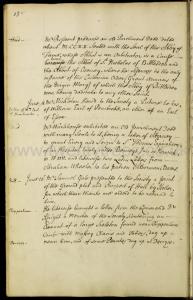
On 04 Jun 1731 Catherine Compton Countess Egmont was born to Charles Compton (age 39) and Mary Lucy (age 21) at Quinta.

On 04 Jun 1738 King George III of Great Britain and Ireland was born to Frederick Louis Hanover Prince of Wales (age 31) and Augusta Saxe Coburg Altenburg (age 18) at Norfolk House, St James' Square. He a grandson of King George II of Great Britain and Ireland.
On 04 Jun 1751 John Scott 1st Earl Eldon was born.
On 04 Jun 1833 Garnet Wolseley 1st Viscount Wolseley was born to Major Garnet Wolseley (age 45) and Frances Anne Smith (age 32).
Thomas Bateman 1845. On the 4th of June, 1845, another large flat barrow was opened, which is situated upon the level summit of a hill upon Alsop Moor, known by the name of Net Lowe Hill [Map]. This barrow is about twenty-five yards in diameter, and not more than two feet in height; it was opened by cutting through it in different directions, so as to divide it into quarters. In each of these trenches, on approaching the centre, were found horses' teeth and an abundance of rats' bones; and in one of them a small piece of a coarse urn. In the centre of the tumulus was found a skeleton extended on its back at full length, and lying on a rather higher level than the surface of the natural soil; close to the right arm lay a large dagger of brass (broken in two by the weight of the superincumbent stones), with the decorations of its handle consisting of thirty rivets, and two pins of brass. In vol. i, plate 23, of Sir Richard Hoare's "Ancient Wiltshire" a dagger is engraved of a precisely similar character the number of rivets or studs and pins being exactly the same; close to this dagger were two highly-polished ornaments made from a kind of bituminous shale known in the south of England as Kimmeridge coal and equally well known to the archaeologist as the material of the coal money and of many other ancient British ornaments. Those in question are circular and moulded round the edges having a round elevation on the fronts to allow of two perforations which meet in an oblique direction on the back for the purpose of attaching the ornaments to some part of the dress or more probably to the dagger-belt of the chief with whose remains they were interred. In vol. 1, plate 34, of Sir Richard Hoare's book a similar ornament of jet is engraved, which is smaller, and does seem to have a moulding round the edge. It is a singular fact that, although the skeleton had evidently been never previously disturbed, the lower jaw lay at the feet of the body. Along with the above-mentioned articles were numerous fragments of calcined flint, and amongst the soil of the barrow were two rude instruments of the same.
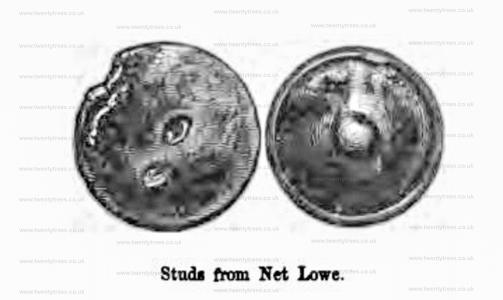
The Diary of George Price Boyce 1851. 04 Jun 1851. Called on Wells (age 22). Miss Guyson, the model, was with him, a good looking girl. She gave him a ticket for the Portland Gallery, National Institution, which I made use of. A fine picture [See Painting] there by Collinson (age 26), P.R.B., from the life of St. Elizabeth of Hungary (price £240).
On 04 Jun 1861 Mary Venetia Cavendish-Bentinck was born to George Cavendish-Bentinck (age 39) and Prudence Penelope Cavendish-Bentinck nee Leslie (age 34).

On 04 Jun 1887 Albert-Ernest Carrier-Belleuse (age 62) died.
On 04 Jun 1913 Emily Wilding Davison (age 40) was hit by the King's (age 48) horse Anmer after she had stepped into its path at Tattenham Corner during the Derby at Epsom Racecourse. The jockey Herbert Jones was injured. The King (age 48) and Queen (age 46) were present. The King recorded in his diary "a most regrettable and scandalous proceeding". She was operated on two days later, but she never regained consciousness.
On 04 Jun 1941 Wilhelm Hohenzollern (age 82) died.
Births on the 4th June
On 04 Jun 1394 Philippa Lancaster Queen Consort Denmark was born to King Henry IV of England (age 27) and Mary Bohun (age 26) at Peterborough Castle [Map]. Her mother (age 26) died in childbirth. She was buried at Church of the Annunciation of our Lady of the Newark [Map]. Coefficient of inbreeding 2.60%. 

On 04 Jun 1415 Piers Legh was born to Piers Legh (age 26) at Lyme Hall [Map].
On 04 Jun 1418 Henry Scrope 4th Baron Scrope of Bolton was born to Richard Scrope 3rd Baron Scrope of Bolton (age 25) and Margaret Neville Baroness Scrope Bolton.

On 04 Jun 1489 Antoine Lorraine II Duke Lorraine was born to René Lorraine II Duke Lorraine Duke of Bar (age 38) and Philippa Egmont Duchess of Bar Duchess Lorraine (age 22) at Bar le Duc.
On 04 Jun 1604 Claudia Medici was born to Ferdinando I de Medici Grand Duke of Tuscany (age 54).
Before 04 Jun 1615 Marmaduke Darcy was born to Conyers Darcy 7th Baron Darcy of Knayth, 1st Baron Darcy Meinhill, 4th Baron Conyers (age 44) and Dorothy Belasyse Baroness Darcy and Conyers (age 43).

On 04 Jun 1677 William Archer was born to William Eyre (age 39) and Katherine Gell.
On 04 Jun 1731 Catherine Compton Countess Egmont was born to Charles Compton (age 39) and Mary Lucy (age 21) at Quinta.

On 04 Jun 1732 Cornwall Fitzfrederick Vane was born illegitimately to Frederick Louis Hanover Prince of Wales (age 25) and Anne Vane in St James' Street. He a grandson of King George II of Great Britain and Ireland.

On 04 Jun 1737 Charles Davers 6th Baronet was born to Jermyn Davers 4th Baronet (age 51) and Margaretta Green.
On 04 Jun 1738 King George III of Great Britain and Ireland was born to Frederick Louis Hanover Prince of Wales (age 31) and Augusta Saxe Coburg Altenburg (age 18) at Norfolk House, St James' Square. He a grandson of King George II of Great Britain and Ireland.
On 04 Jun 1739 John Aubrey 6th Baronet was born to Thomas Aubrey 5th Baronet (age 31) and Martha Carter Lady Aubrey.
On 04 Jun 1741 Edward Stracey 1st Baronet was born.
On 04 Jun 1742 Jacob Bouverie was born to Jacob Bouverie 1st Viscount Folkestone (age 47) and Elizabeth Marsham Viscountess Fokestone (age 30).
On 04 Jun 1751 John Scott 1st Earl Eldon was born.
On 04 Jun 1752 Charles Finch was born to Heneage Finch 3rd Earl Aylesford (age 36) and Charlotte Seymour Countess Aylesford (age 21).

On 04 Jun 1775 William Henry Byng was born to George Byng 4th Viscount Torrington (age 34) and Lucy Boyle Viscountess Torrington.

On 04 Jun 1777 Henry Every 9th Baronet was born to Edward Every 8th Baronet (age 23).
On 04 Jun 1784 Alfred John Kempe was born to John Kempe and Anne Arrow.
On 04 Jun 1794 Archibald Kennedy was born to Archibald Kennedy 1st Marquess of Ailsa (age 24) and Margaret Erskine Marchioness Ailsa (age 22).
On 04 Jun 1800 George Savile Foljambe was born to John Savile Foljambe (age 24) and Elizabeth Willoughby (age 26) at Aldwark, North Yorkshire [Map].
On 04 Jun 1810 John Savile 4th Earl Mexborough was born to John Savile 3rd Earl Mexborough (age 26) and Anne Yorke Countess Mexborough (age 27).

On 04 Jun 1819 Thomas Bateson 1st Baron Deramore was born to Robert Bateson 1st Baronet (age 37).
Before 04 Jun 1827 George Bannerman 10th Baronet was born to Thomas Bannerman (age 31).
On 04 Jun 1828 George Cubitt 1st Baron Ashcombe was born to Thomas Cubitt (age 40) and Mary Anne Warner (age 26).
On 04 Jun 1833 Garnet Wolseley 1st Viscount Wolseley was born to Major Garnet Wolseley (age 45) and Frances Anne Smith (age 32).
On 04 Jun 1843 Mary Bruce was born to James Bruce 12th Earl Kincardine 8th Earl Elgin (age 31) and Elizabeth Mary Cumming Bruce Countess Kincardine and Elgin at Jamaica. On 07 Jun 1843 she and her mother died.
On 04 Jun 1844 Alice Maria Prinsep was born to Henry Thoby Prinsep (age 51) and Sarah Monckton Pattle (age 27).
On 04 Jun 1846 Fredrick George Lindley Meynell was born to Charles Wood 1st Viscount Halifax (age 45) and Mary Grey Viscountess Halifax (age 39).
On 04 Jun 1851 George Howland William Beaumont 10th Baronet was born to George Howland Beaumont 9th Baronet (age 22) and Pauline Menzies Belli Lady Beaumont (age 22).
On 04 Jun 1861 Mary Venetia Cavendish-Bentinck was born to George Cavendish-Bentinck (age 39) and Prudence Penelope Cavendish-Bentinck nee Leslie (age 34).

On 04 Jun 1864 Adelaide Alexandra Gilliat was born to Richard Gilliat of Barham, Sussex in New South Wales, Australia.
On 04 Jun 1871 Beatrice Mary Leslie Hore-Ruthven was born to Walter Hore-Ruthven 9th Baron Ruthven (age 32) and Caroline Gore (age 23).
On 04 Jun 1889 Cicely Mordaunt was born to Charles Mordaunt 10th Baronet (age 53) and Mary Louisa Cholmondeley Lady Massingham Parva (age 37).

On 04 Jun 1892 David Cecil Lycett Green was born to Edward Lycett Green 2nd Baronet (age 32) and Ethel Mary Wilson Lady Green (age 27).
On 04 Jun 1892 Charles Alfred Euston Fitzroy 10th Duke Grafton was born to Charles Edward Fitzroy (age 35) and Ismay Fitzroy (age 29) at Euston Hall, Suffolk.
On 04 Jun 1897 Major Vivian Lionel Slingsby Bethell was born to Lionel Beresford Bethell (age 33).
On 04 Jun 1918 Ronald Horace Brooke-Pechell 9th Baronet was born to Major Hugh Charles Pechell (age 27).
On 04 Jun 1960 John Gerald Strutt 6th Baron Rayleigh was born to Charles Richard Strutt (age 50).
Marriages on the 4th June
On 04 Jun 1337 Charles "Saint" Chatillon Duke Brittany (age 18) and Joan "Lame" Capet Countess Penthièvre (age 18) were married at Paris [Map]. She the daughter of Guy Capet Count Penthièvre and Jeanne Avaugour Countess Penthièvre. He the son of Guy Chatillon I Count Blois and Margaret Valois (age 42). They were fourth cousins. He a great x 5 grandson of King Henry "Curtmantle" II of England. She a great x 2 granddaughter of King Henry III of England. 
BeforeOn 04 Jun 1418 Richard Scrope 3rd Baron Scrope of Bolton (age 25) and Margaret Neville Baroness Scrope Bolton were married. She the daughter of Ralph Neville 1st Earl of Westmoreland (age 54) and Margaret Stafford Baroness Neville Raby. They were fourth cousins. She a great x 4 granddaughter of King Edward "Longshanks" I of England. 


On 04 Jun 1469 Lorenzo de Medici (age 20) and Clarice Orsini (age 19) were married. The marriage had been arranged by his mother Lucrezia Tornabuoni (age 41). Her dowry was 6000 florins.
On 04 Jun 1509 Robert Maxwell 5th Lord Maxwell (age 16) and Janet Douglas Lady Maxwell (age 43) were married. She by marriage Lord Maxwell. The difference in their ages was 27 years; she, unusually, being older than him.

Before 04 Jun 1535 John St Leger and Catherine Neville (age 15) were married. The date confirmed by the mentioned in her father's will that they were married. He had been a ward of her father George Neville 5th and 3rd Baron Bergavenny (age 66). They were fourth cousins. She a great x 4 granddaughter of King Edward III of England. 

On 04 Jun 1550 Robert Dudley 1st Earl of Leicester (age 17) and Amy Robsart (age 17) were married at Sheen Palace [Map]. King Edward VI of England and Ireland (age 12) and William Cecil 1st Baron Burghley (age 29) attended. He the son of John Dudley 1st Duke Northumberland (age 46) and Jane Guildford Duchess Northumberland (age 41).


On 04 Jun 1572 Oliph Leigh (age 12) and Jane Browne of Betchworth Castle were married.
On or after 04 Jun 1606, the date of the settlement, Robert Needham 2nd Viscount Kilmorey (age 18) and Frances Anderson were married.
Before 04 Jun 1630 James Douglas 2nd Earl Queensberry (age 8) and Mary Hamilton were married. She the daughter of James Hamilton 2nd Marquess Hamilton and Ann Cunningham Marchioness Hamilton (age 45). He the son of William Douglas 1st Earl Queensberry (age 48) and Isabel Kerr Countess Queensberry. They were half fourth cousins.
On 04 Jun 1646 Thomas Grey (age 23) and Dorothy Bourchier (age 19) were married. She the daughter of Edward Bourchier 4th Earl Bath and Dorothy St John Countess Bath. He the son of Henry Grey 1st Earl Stamford (age 47) and Anne Cecil Countess Stamford (age 50).



On 04 Jun 1668 Francis Brudenell (age 14) and Frances Savile (age 10) were married. She the daughter of Thomas Savile 1st Earl of Sussex and Anne Villiers Countess Sussex. He the son of Robert Brudenell 2nd Earl Cardigan (age 61) and Anna Savage Countess Cardigan.



Before 04 Jun 1677 William Eyre (age 39) and Katherine Gell were married.
On or after 04 Jun 1696, the date of their marriage license, John Guise 3rd Baronet (age 19) and Elizabeth Napier Lady Guise were married. She by marriage Lady Guise of Elmore in Gloucestershire. They were fourth cousins.
On 04 Jun 1724 Charles Radclyffe Earl Newburgh (age 30) and Charlotte Livingstone 3rd Countess Newburgh (age 30) were married. He by marriage Earl of Newburgh. She the daughter of Charles Livingston 2nd Earl of Newburgh and Frances Brudenell Countess Newburgh. He the son of Edward Radclyffe 2nd Earl Derwentwater and Mary Tudor Countess Derwentwater (age 50). They were third cousin once removed. He a grandson of King Charles II of England Scotland and Ireland. 


Before 04 Jun 1739 Thomas Aubrey 5th Baronet (age 31) and Martha Carter Lady Aubrey were married.
On 04 Jun 1765 John Perceval 3rd Earl Egmont (age 27) and Isabella Powlett Countess Egmont were married. He the son of John Perceval 2nd Earl Egmont (age 54) and Catherine Cecil Countess Egmont. They were first cousin once removed. She a great x 2 granddaughter of King Charles II of England Scotland and Ireland. 

On 04 Jun 1768 George Bowyer 5th and 1st Baronet (age 28) and Henrietta Brett Lady Bowyer (age 15) were married.
On 04 Jun 1778 John Smyth (age 30) and Georgiana Fitzroy (age 21) were married. She the daughter of Augustus Henry Fitzroy 3rd Duke Grafton (age 42) and Anne Liddell Duchess Grafton (age 41). She a great x 3 granddaughter of King Charles II of England Scotland and Ireland. 

On 04 Jun 1788 Robert Vyner (age 26) and Theodosia Maria Ashburnham (age 22) were married. She the daughter of John Ashburnham 2nd Earl Ashburnham (age 63) and Elizabeth Crowley Countess Ashburham.
On 04 Jun 1801 Cornelius Smelt (age 52) and Anne Hale (age 33) were married.
On 04 Jun 1827 Frederick Twisleton-Wykeham-Fiennes 10th or 16th Baron Saye and Sele (age 27) and Emily Wingfield (age 29) were married.
Before 04 Jun 1851 George Howland Beaumont 9th Baronet (age 22) and Pauline Menzies Belli Lady Beaumont (age 22) were married. She by marriage Lady Beaumont of Stoughton Grange in Leicestershire.
On 04 Jun 1868 George Compton Reade 9th Baronet (age 22) and Melissa Ray Lady Reade were married.
Before 04 Jun 1871 Walter Hore-Ruthven 9th Baron Ruthven (age 32) and Caroline Gore (age 23) were married. She the daughter of Philip Gore 4th Earl Arran (age 69) and Elizabeth Marianne Napier Countess Arran (age 51).
On 04 Jun 1872 John "Yvo" Vesey 4th Viscount Vesci (age 28) and Evelyn Charteris Viscountess Vesci (age 23) were married. She the daughter of Francis Richard Charteris 10th Earl of Wemyss (age 53) and Anne Frederica Anson Countess Wemyss (age 49).
On 04 Jun 1883 Richard George Penn Curzon 4th Earl Howe (age 22) and Georgiana Elizabeth Spencer-Churchill Countess Howe (age 23) were married at St George's Church, Hanover Square. She the daughter of John Winston Spencer-Churchill 7th Duke of Marlborough (age 61) and Frances Anne Emily Vane Duchess of Marlborough (age 61). He the son of Richard William Penn Curzon Howe 3rd Earl Howe (age 61) and Isabella Maria Katherine Anson Countess Howe (age 51).

On 04 Jun 1889 John Douglas-Scott-Montagu 2nd Baron Montagu of Beaulieu (age 22) and Cecil Victoria Kerr Baroness Montagu of Beaulieu (age 23) were married. She the daughter of Schomberg Henry Kerr Kerr 9th Marquess Lothian (age 55) and Victoria Alexandrina Montagu-Douglas-Scott Marchioness Lothian (age 44). They were first cousins.
On 04 Jun 1907 Brigadier Eric FitzGerald Dillon 19th Viscount Dillon (age 26) and Nora Juanita Muriel Beckett Viscountess Dillon were married.
Deaths on the 4th June
On 04 Jun 863 Charles Carolingian Archbishop of Mainz (age 38) died.
On 04 Jun 1094 Sancho Ramírez I King Aragon V King Pamplona (age 52) died. On 04 Jun 1094 His son Peter I King Aragon I King Pamplona (age 26) succeeded I King Aragon, I King Pamplona.
On 04 Jun 1094 Sancho Ramírez Count Ribagorza (age 51) died.
On 04 Jun 1155 Baldwin Redvers 1st Earl Devon died. His grandson Richard Redvers 2nd Earl Devon succeeded 2nd Earl Devon.
On 04 Jun 1246 Isabella of Angoulême Queen Consort England (age 58) died at Fontevraud Abbey [Map]. Her son Hugh Lusignan XI Count Lusignan VI Count La Marche II Count Angoulême (age 25) succeeded II Count Angoulême. Yolande Capet Countess Lusignan, La Marche and Angoulême (age 27) by marriage Countess Angoulême.

On 04 Jun 1339 Margaret Vernon (age 49) died at Hunstanton, Norfolk.
On 04 Jun 1361 John Coggeshall (age 59) died.
On 04 Jun 1375 John Grey 2nd Baron Grey (age 59) died. His son Bartholomew Grey 3rd Baron Grey (age 28) succeeded 3rd Baron Grey of Rotherfield.
After 04 Jun 1375 Bartholomew Grey 3rd Baron Grey (age 28) died. His brother Robert Grey 4th Baron Grey (age 26) succeeded 4th Baron Grey of Rotherfield.
On 03 Feb 1388 the Merciless Parliament commenced. It ended on 04 Jun 1388. Its primary function was to prosecute members of the Court of King Richard II of England (age 21). The term "Merciless" is contemporary having been coined by the chronicler Henry Knighton.
Michael de la Pole 1st Earl Suffolk (age 58) was sentenced to be hanged, drawn and quartered in his absence. He had escaped to France.
Archbishop Alexander Neville (age 47) was found guilty of treason and it was determined to imprison him for life in Rochester Castle, Kent [Map]. He fled to Louvain [Map] where he became a parish priest for the remainder of his life.
On 19 Feb 1388 Robert Tresilian was hanged naked and his throat cut. See Chronicle of Adam of Usk.
On 25 Mar 1388 Nicholas Brembre was hanged. He was buried at Christ Church Greyfriars [Map].
On 05 May 1388 Simon Burley (age 48) was executed despite the protestations of his friend Edmund of Langley 1st Duke of York (age 46). See Chronicle of Adam of Usk.
On 12 May 1388 John Beauchamp 1st Baron Beauchamp (age 69) was beheaded at Tower Hill [Map]. He was buried at Worcester Cathedral [Map]. Baron Beauchamp of Kidderminster forfeit.
Robert de Vere 1st Duke Ireland (age 26) was attainted.
On 04 Jun 1475 John Windham (age 65) died.
On 04 Jun 1486 Robert Giffard (age 66) died at Chillington, Staffordshire.
On 04 Jun 1514 John Clinton 7th Baron Clinton (age 44) died. His son Thomas Clinton 8th Baron Clinton (age 24) succeeded 8th Baron Clinton. Jane Poynings Baroness Clinton by marriage Baroness Clinton.

On 04 Jun 1524 Thomas Blount (age 69) died at Astley.
On 04 Jun 1535 Anna Oldenburg (age 8) died.
After 04 Jun 1535 George Neville 5th and 3rd Baron Bergavenny (age 66) died. He was buried at All Saints Church, Birling; his heart was buried at Mereworth, probably St Lawrence's Church, Mereworth. His son Henry Neville 6th and 4th Baron Bergavenny (age 5) succeeded 6th Baron Bergavenny, 4th Baron Bergavenny.
On 04 Jun 1584 Roger Strange of Hunstanton (age 59) died.
On 24 Jun 1584 Dorothy Vernon (age 53) died. On 04 Jun 1611 John Manners (age 84) died at Haddon Hall [Map]. Both were buried at All Saint's Church, Bakewell, Derbyshire [Map]. Elizabethan Period facing each other. Complex armorial of his arms impaled with her arms.

Arms of John Manners (age 57) impaled with those of Dorothy Vernon (age 53).

On the left, Top Row: 1  Manners Augmented Arms 2 His great-grandmother Eleanor Ros.
Manners Augmented Arms 2 His great-grandmother Eleanor Ros.
Second Row: 5  Beauchamp Arms 6
Beauchamp Arms 6  Beaumont Arms 7
Beaumont Arms 7  Berkeley Arms 8
Berkeley Arms 8  Lisle Arms.
Lisle Arms.
Third Row: 11  Tiptoft Arms.
Tiptoft Arms.
On the right the arms of Dorothy Vernon (age 53). Top Row: 1  Vernon Arms. Her arms. Second Row: 5
Vernon Arms. Her arms. Second Row: 5  Welles Arms. Third Row: 9
Welles Arms. Third Row: 9  Tailboys Arms. Fourth Row: 10
Tailboys Arms. Fourth Row: 10  Berkeley Arms.
Berkeley Arms.
Dorothy Vernon: In 1531 she was born to George Vernon "King of the Peak" and Margaret Tailboys. Before 22 Mar 1572 John Manners and she were married. He the son of Thomas Manners 1st Earl of Rutland and Eleanor Paston Countess Rutland. He a great x 5 grandson of King Edward III of England.
John Manners: In 1527 he was born to Thomas Manners 1st Earl of Rutland and Eleanor Paston Countess Rutland.
Eleanor Ros: Around 1449 she was born to Thomas Ros 9th Baron Ros Helmsley and Philippa Tiptoft Baroness Ros of Helmsley. In or before 1460 Robert Manners and she were married. He a great x 5 grandson of King Edward "Longshanks" I of England. She a great x 5 granddaughter of King Edward "Longshanks" I of England. In 1487 Eleanor Ros died. In 1492 George Manners 11th Baron Ros Helmsley became a ward of his uncle-in-law Thomas Lovell, husband of his mother's sister Isabel Ros as a consequence of his father Robert Manners being deemed unable to administer his own affairs.







On 04 Jun 1592 François de Bourbon Duke of Montpensier (age 50) died.
On 04 Jun 1592 Anne Wyatt (age 49) died.
On 04 Jun 1597 Thomas Wroughton (age 67) died.
On 04 Jun 1606 Edmund Pelham (age 73) died at Bath, Somerset [Map].
On 04 Jun 1627 Marie Bourbon Duchess Montpensier (age 21) died.
On 04 Jun 1633 Christian Oldenburg (age 62) died.
On 04 Jun 1645 Frances Coke Viscountess Purbeck (age 42) died at Oxford, Oxfordshire [Map]. She was buried at the Church of St Mary the Virgin.
On 04 Jun 1648 George Seton Master of Seton (age 35) died.
Before 04 Jun 1662 Simon Archer (age 80) died.
On 04 Jun 1663 Archbishop William Juxon (age 81) died.
Before 04 Jun 1666 William Clarke (age 43) died after having had his leg amputated following the Four Days' Battle.
On 04 Jun 1670 Christopher Hatton 1st Baron Hatton (age 64) died. His son Christopher Hatton 1st Viscount Hatton (age 38) succeeded 2nd Baron Hatton.
On 04 Jun 1680 Augustus Duke of Saxe Weissenfels (age 65) died.
On 04 Jun 1698 Arabella Cavendish (age 24) died.
On 04 Jun 1699 Popham Seymour-Conway (age 24) drunkenly duelled with Captain George Kirk of the Royal Horse Guards; he was wounded in the neck.
On 18 Jun 1699 he died from wounds received duelling. His estates were inherited by his younger brother Francis Seymour-Conway 1st Baron Conway (age 20).
On 04 Jun 1710 James Stuart 1st Earl Bute (age 44) died. His son James Stuart 2nd Earl Bute (age 14) succeeded 2nd Earl Bute. Anne Campbell Countess Bute (age 24) by marriage Countess Bute.
On 04 Jun 1723 Léopold Clement Charles Lorraine (age 16) died of smallpox.
On 04 Jun 1724 Richard Bulkeley 4th Viscount Bulkeley died. His son Richard Bulkeley 5th Viscount Bulkeley succeeded 5th Viscount Bulkeley of Cashel in Tipperary.
On 04 Jun 1729 William Cavendish 2nd Duke Devonshire (age 57) died. His son William Cavendish 3rd Duke Devonshire (age 30) succeeded 3rd Duke Devonshire, 6th Earl Devonshire, 6th Baron Cavendish Hardwick. Catherine Hoskyns Duchess Devonshire (age 30) by marriage Duchess Devonshire.
On 04 Jun 1729 John Delaval 3rd Baronet (age 74) died. Baronet Delaval of Seaton in Northumberland extinct. Possibly succeeded by son Thomas?
On 04 Jun 1736 Thomas Fane 6th Earl of Westmoreland (age 54) died. His brother John Fane 7th Earl of Westmoreland (age 51) succeeded 7th Earl of Westmoreland, 10th Baron Despencer, 7th Baron Burghesh in Suffolk. Mary Cavendish Countess of Westmoreland (age 36) by marriage Countess of Westmoreland.

On 04 Jun 1738 Maria Skerritt (age 36) died.
On 04 Jun 1744 Caroline Bertie died.
On 04 Jun 1745 Johann Wilhelm Saxe Coburg Saalfeld (age 19) was killed.
On 04 Jun 1756 Charles Tracy 5th Viscount Tracy (age 65) died. He was buried at Toddington, Gloucestershire.
On 04 Jun 1756 General Henry Cornewall (age 71) died unmarried.
On or before 04 Jun 1763 William Wheler 5th Baronet (age 59) died. He was buried at All Saints' Church, Leamington Hastings on 04 Jun 1763. His son William Wheeler 6th Baronet (age 36) succeeded 6th Baronet Wheler of the City of Westminster. Lucy Knightley Lady Wheler by marriage Lady Wheler of the City of Westminster.
On 04 Jun 1798 Edward Fitzgerald (age 34) died whilst imprisoned at Newgate Prison. He was buried the next day at St Werburgh's Church Dublin.
On 04 Jun 1802 Bishop Lewis Bagot (age 62) died.
On 04 Jun 1802 Henry Fane of Fulbeck (age 63) died. He was buried at St Nicholas' Church, Fulbeck. General Henry Fane (age 23) inherited Fulbeck Hall.
On 04 Jun 1806 Charles Davers 6th Baronet (age 69) died without legitimate issue. Baronet Davers of Rougham in Suffolk extinct. He was buried in St Nicholas' Church, Rushbrooke.
On 04 Jun 1810 Thomas Palmer (age 39) died.
On 04 Jun 1810 William Windham (age 60) died in his sleep in the presence of his wife following an operation.
On 04 Jun 1818 John James died.
On 04 Jun 1827 Henrietta Bentinck Countess Stamford and Warrington (age 90) died.
On 04 Jun 1833 Peter King 7th Baron King (age 56) died.
On 04 Jun 1844 Duke Louis Antoine of Angoulême (age 68) died.
On 04 Jun 1849 Robert William Devereux Shirley (age 23) died.
On 04 Jun 1850 Lieutenant Colonel William John Lamb Campbell of Glenfalloch (age 62) died.
On 04 Jun 1855 Charlotte Wilmot-Sitwell (age 33) died.
On 04 Jun 1868 Henry John Chetwynd-Talbot 3rd Earl Talbot 18th Earl of Shrewsbury (age 64) died. His son Charles Chetwynd-Talbot 19th Earl of Shrewsbury 4th Earl Talbot (age 38) succeeded 19th Earl of Shrewsbury, 19th Earl Waterford, 4th Earl Talbot, 4th Viscount Ingestre, 5th Baron Talbot of Hensol in Glamorganshire . Anna Theresa Cockerell Countess Shrewsbury and Waterford (age 32) by marriage Countess of Shrewsbury, Countess Waterford, Countess Talbot.
On 04 Jun 1868 Frederick Baring (age 62) died.
On 04 Jun 1870 Barbara Augusta Norah Mytton (age 47) died.
On 04 Jun 1872 Henry John Milbank (age 47) died.
On 04 Jun 1887 Albert-Ernest Carrier-Belleuse (age 62) died.
On 04 Jun 1898 Louisa Eleanor Georgina Fitzgibbon (age 72) died.
On 04 Jun 1904 Marie Hanover (age 54) died.
On 04 Jun 1906 Charles Tennant 1st Baronet (age 82) died. His son Edward Tennant 1st Baron Glenconner (age 47) succeeded 2nd Baronet Tennant of The Glen and St Rollox.
On 04 Jun 1914 William Reynell Anson 3rd Baronet (age 70) died unmarried. His nephew Denis George William Anson 4th Baronet (age 25) succeeded 4th Baronet Anson of Birch Hall in Lancashire; he drowned in the River Thames one month later.
On 04 Jun 1915 Lieutenant John Harley (age 35) died during the Battle of Crithia at Kereve Dere, Gallipoli. The Officer Commanding the 1st Batallion, King's Own Scottish Borderers, forming part of the XXIXth Division to which he was attached, wrote "Your son was in command of the platoon in the right company of the first line to advance against the enemy's trenches, and I regret to say that after gallantly leading his men out of the trenches he was not able to live in the very heavy fire that was brought to bear upon the advancing troops. His body was buried, probably near where he fell.
On 04 Jun 1917 Alexander Fuller-Acland-Hood 1st Baron St Audries (age 63) died. His son Alexander Peregrine Fuller-Acland-Hood 2nd Baron St Audries (age 23) succeeded 2nd Baron St Audries of St Audries in Somerset, 5th Baronet Hood of Tidlake in Surrey, 7th Baronet Bateman of Hartington Hall in Derbyshire.
On 04 Jun 1941 Wilhelm Hohenzollern (age 82) died.
On 04 Jun 1966 Sybil Grey (age 83) died.